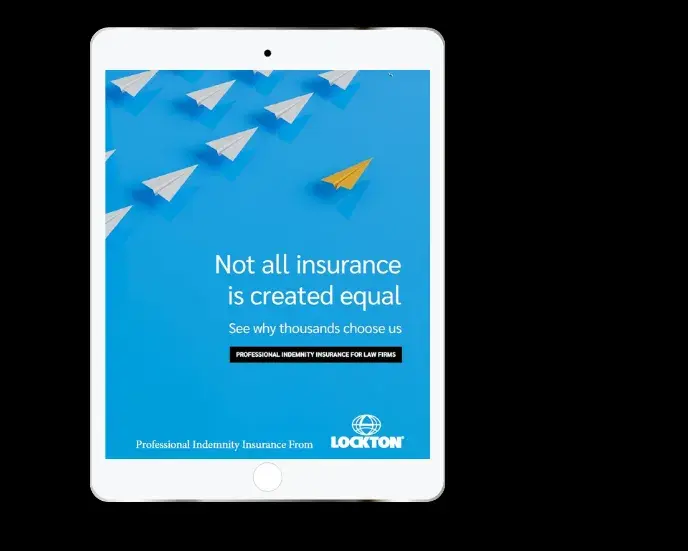Skip to main content









Get ahead, get covered
Secure your PII quoteThe quality of your solicitors professional indemnity insurance underpins your integrity and reputation among your clients. As a regulatory requirement, it is critical that your cover performs effectively for you and your practice. Our dedicated and knowledgeable team is committed to providing excellent service, working on your behalf to provide impartial, cost-effective cover that is tailored to your own unique circumstances.
Expertly tailored to your needs
Running a law firm comes with many challenges and complexities. We get that. And that’s why we provide bespoke insurance solutions based on a thorough understanding of your business and your objectives. We leave no stone unturned as we craft tailored solutions for you. Our team will be on hand to provide knowledgable specialist advice on any aspect of your professional indemnity cover. We have the expertise and the resources to deliver solutions that align with your strategic objectives.
Protecting your firm and your reputation
Your Professional Indemnity Insurance is there to protect your reputation and your bottom line. To be sure it does both, you need an expert risk and insurance partner who delivers outstanding client service. You need a partner who can provide cost-effective tailored cover to match the exact needs of your firm, whatever its size, whatever the scope of its activities.
With Lockton, you get much more than just an insurance policy.
- Bespoke insurance solutions for firms of all sizes
- Full claims support and expert advocacy
- One main point of contact ready to support you whenever you need us
- Specialist advice tailored to the world you work in
- Regular updates on developments in legal-sector risk and insurance issues
What we offer your firm
Your business is about relationships - so is ours. We identify risks, highlight opportunities, and provide tailored solutions. Download our brochure to find out more.
Learn moreMeet our Solicitors team
Brian Boehmer
Partner
brian.boehmer@lockton.com
+44 207 933 2083
Marc Rowson
Partner
marc.rowson@lockton.com
+44 207 933 2034
Stephen Davey
Partner
stephen.davey@lockton.com
+44 207 933 2667
Simon Mantell
Partner, Professional & Financial Risks – UK
simon.mantell@lockton.com
+44 79 20137550
Get in touch
Solicitors Professional Indemnity Insurance FAQs
How does the type of work my law firm undertakes impact the cost of my solicitors professional indemnity insurance?
The type of work undertaken by a law firm is one of the two key rating points an underwriter will take into account when calculating what premium to charge for a solicitors professional indemnity insurance policy. Underwriters will attribute a particular level of risk for the work done within each practice area. For example, commercial and residential conveyancing is consistently seen as the highest level of risk on underwriters’ risk matrices.
Will making a claim adversely my solicitors professional indemnity premium?
The impact of a claim on the cost of your solicitors professional indemnity insurance premium depends on the cost of that claim relative to the premium. The higher it is in proportion, the more likely the claim could trigger an increase in the cost of your solicitors professional indemnity insurance. A professional indemnity insurer will also consider the nature of the claim, whether the issue is a systemic one, and whether adequate risk management measures were in place prior to the claim. The more positive the insurer’s view, the less likely it is to have a significant negative impact on a law firm’s premiums.
Do I need to use an insurance broker to buy solicitors professional indemnity insurance?
To access most of the insurers who provide solicitors professional indemnity insurers, law firms will need to go through an insurance broker. Insurance brokers are authorised and regulated by the Financial Conduct Authority (FCA) and carry their own professional indemnity cover.
Different brokers offer different levels of service. A transactional insurance broker will simply place solicitors professional indemnity policies with insurers, whereas an advisory insurance broker will go further and offer independent professional advice and guidance.
When choosing an insurance broker, there are three key questions to ask:
Is the broker a specialist in solicitors professional indemnity insurance (PII)?
How many years’ experience does the broker (and its employees) have in placing solicitors PII?
Which solicitors professional indemnity insurers can the broker access directly?
How much do law firms pay for solicitors professional indemnity insurance (PII)?
The cost of a solicitors PII policy will vary from law firm to law firm, as it is determined by the unique risk factors applicable to each practice.
There are five key areas that influence the premium level:
Which types of work the law firm undertakes
The firm’s gross fee income
The claims history of the law firm
Risk management practices within the law firm
The firm’s structure and location.
Has The Law Society provided solicitors professional indemnity insurance (PII) to law firms?
Between 1987 and 2000, The Law Society provided compulsory professional indemnity cover to all law firms in England and Wales. This was arranged through a mutual known as the Solicitors Indemnity Fund (SIF) which was managed by the Solicitors Indemnity Fund Limited (SIFL). From 1 September 2000, law firms opted to move to an open-market scheme. This gave law firms greater choice and encouraged competition between solicitors professional indemnity insurers.
Since 2000, SIF has remained liable for providing expired run-off cover, also known as post six-year run-off cover (PSYROC) to law firms whose six-year run-off policy has elapsed. How long this arrangement will persist is uncertain. However, following a recent consultation by the Solicitors Regulatory Authority (SRA), it would appear that it will stay in force until at least September 2023 to allow full consideration of the points raised in the consultation feedback.
Do all lawyers need solicitors professional indemnity insurance?
All law firms in England and Wales are authorised and regulated by the Solicitors Regulatory Authority (SRA). It is mandatory for all law firms to purchase solicitors professional indemnity insurance to ensure that their clients are adequately protected from civil liability claims.
It is common practice to use an insurance broker, as brokers have access to multiple solicitors professional indemnity insurers and can provide specialist guidance and insight on solicitors PII. Each insurer will have its own requirements, with some preferring to insure sole practitioners and others targeting top-200 law firms.
What does solicitors professional indemnity insurance cover you for legally?
Solicitors professional indemnity insurance covers claims made against law firms in respect of financial losses resulting from negligence, error or omission in law firms’ provision of professional advice or legal services. As trusted advisors to many law firms, we encourage you to focus on your internal risk management processes and procedures. Your solicitors PII policy is there to protect and defend you from spurious claims.
What level of solicitors PII cover do I need?
The mandatory minimum professional indemnity cover limit for law firms is either £2 million or £3 million. The intended status of your law firm will determine whether you require a minimum £2 million or £3 million limit of indemnity cover. A £2 million limit is required for all sole practitioners and partnerships. For limited and LLP entities, the limit is £3 million. It is common practice for for law firms to purchase limits of indemnity above the minimums specified by the SRA.
How much does PI cost?
Solicitors professional indemnity insurance is a complex insurance product. Given that claims can arise long after the policy was written, the cost of professional indemnity insurance will vary significantly from law firm to law firm. There are multiple factors that could impact cost. But, in simplistic terms, the two biggest drivers will be your activity profile and your fee income, i.e. what kind of work your firm does, and how much of it.
Ready for a relationship that gives you more?
We’d love to hear about your organisation and your ambitions. And we can’t wait to start helping you find better deal and gain greater advantage.
Let’s Talk
